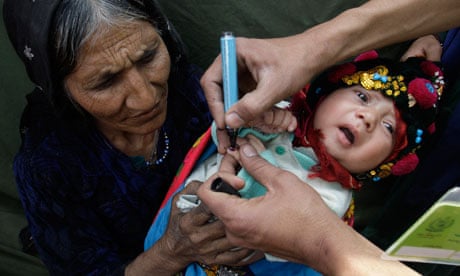I was in New York on 11 September 2001, standing near one of the TV screens in the media section of Unicef's communication division, where I headed up Unicef's global communication work on immunisation. As the second plane crashed into the twin towers, we were quickly evacuated out of Unicef headquarters. I remember looking at the tall UN secretariat on First Avenue, home of the UN security council and the office of the UN secretary general. The building had always struck me as looking so graceful, but that morning it just looked like another ideal terrorist target. In fact, I never looked at the UN secretariat building with the same eyes again, and the impacts of that day – and the weeks and months that followed – were just the beginning of a changed, less trusting, anxious world.
The impacts of that day in New York became an unexpected thread in my Unicef work and the current research I lead at the London School of Hygiene and Tropical Medicine, where we monitor trends in vaccine confidence globally.
Last week's call by the World Health Assembly for an emergency response to polio eradication is not unrelated to the news that Dr Shakil Afridi has been convicted of treason in Pakistan and sentenced to 33 years in prison. Dr Afridi, former surgeon general of the Khyber agency, was central to the CIA-led fake vaccination drive used to confirm the presence of Osama bin Laden in his compound in Abbottabad, Pakistan.
The news of Dr Afridi's role did not emerge until a Guardian article in July 2011, when it shook the immunisation world. Although Dr Afridi had pretended to provide a hepatitis B vaccination, not normally a door-to-door delivery, the news had a particularly strong impact on those working in polio eradication, where door-to-door vaccination is the norm. Anxieties and distrust about the polio vaccine and its western providers were rampant in some communities, and suspicions about CIA links with the polio vaccination campaigns, and rumours they were a front for the sterilising of Muslims, had been around for a decade after 9/11. After years of working to dispel myths about CIA links to the polio eradication efforts – from northern Nigeria to Pakistan and India, all of the work seemed fruitless.
It is no coincidence that the remaining three countries in the world which have polio endemics are Nigeria, Afghanistan and Pakistan. Yes, there are geographical challenges and financial challenges. And, yes, finding Bin Laden has been a global security priority. But deep-seated suspicions about the motives of those who provide polio vaccines have persisted in some circles from Nigeria to Pakistan, and the CIA's choice of immunisation as a strategy to find Bin Laden has only given credence to the conspiracies.
There must have been a better, more ethical, way. This choice of action has jeopardised people's trust in vaccines, and in particular the polio-eradication campaign, now so close to success – broken trust that will take years to restore. Was this strategy worth this sacrifice of trust and the loss of opportunity for the final eradication of a disease scourge – another threat to human security? These are actions where the age-old Hippocratic oath might have urged caution.
